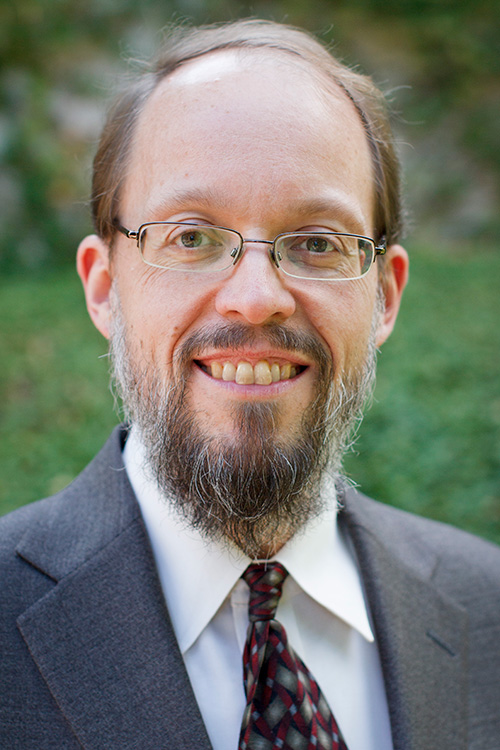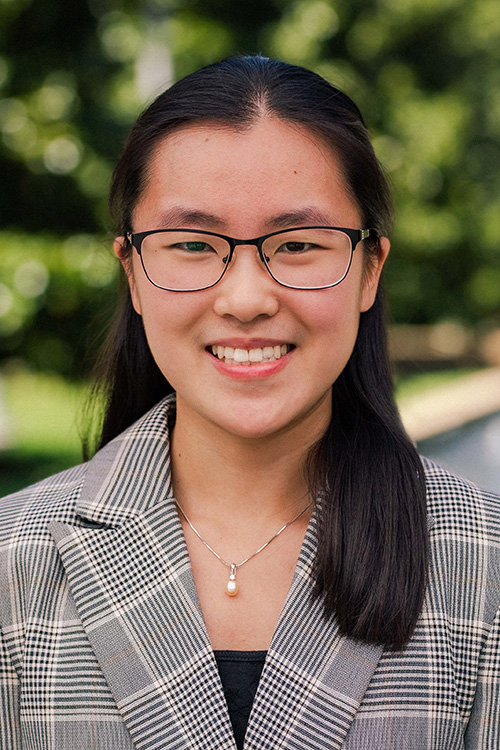
Each year, colleges and universities across the U.S. nominate up to four of their most talented undergraduates majoring in science, engineering or math for the Barry Goldwater Scholarship and Excellence in Education Foundation awards. The Goldwater scholarships support sophomores and juniors who show exceptional promise to become the next generation of research leaders.
For the first time, all four nominees from The University of Texas at Dallas were named winners of the prestigious award, a significant accomplishment that outpaced the performance of other top-tier research institutions, said Dr. Douglas Dow, coordinator of the Office of Distinguished Scholarships and interim dean of the Hobson Wildenthal Honors College.
UT Dallas is one of only 14 institutions — and the only one in Texas — to have all four of its nominees recognized this year. A handful of universities had five nominees honored because they included transfer students.
“We are so proud of the accomplishments of each of our Goldwater Scholars,” Dow said. “It is yet more confirmation that UT Dallas is recognized across the STEM [science, technology, engineering and math] disciplines as a top location for undergraduate research training.”
The Barry Goldwater Scholarship and Excellence in Education Foundation, established by Congress in 1986 to honor the late Arizona senator, awards the scholarships of up to $7,500 per academic year. The 417 winners of the 2022-2023 Goldwater scholarships were chosen from 1,242 natural science, engineering and mathematics students who were nominated by 433 academic institutions.
Pratik Koppikar

Koppikar, a biology major in the School of Natural Sciences and Mathematics, focuses his research on neuroscience and genetics. Currently, he is working on a project to quantify a protein found in neuron synapses.
An avid reader of science fiction, Koppikar first became interested in science as a child. He began laboratory research in his first year at UT Dallas.
“Conducting research as an undergraduate student at UT Dallas is immensely rewarding,” he said. “There are so many opportunities that the University provides, if you’re willing to look for them.”
Dr. Joseph Pancrazio, vice president for research and innovation, a professor of bioengineering, and Koppikar’s mentor, said, “Pratik is a polymath, able to engage in wide-ranging and diverse areas — from neuroscience to political science — with focus and resolve.”
Koppikar said he ultimately wants to earn a PhD in neurobiology and give back to the scientific community.
“I hope that by working toward doing good science, I’ll not only contribute to the neuroscience and genetics communities, but also toward an interdisciplinary understanding of how we come to be ourselves,” he said.
Koppikar, a 2019 UT Dallas Eugene McDermott Scholar and a National Merit Scholar, is an author of a paper that appeared in the Oct. 27, 2021, edition of the journal Micromachines.
Parsa Modareszadeh

Modareszadeh, a biology major, conducts research with mentor Dr. Li Zhang, the Cecil H. and Ida Green Distinguished Chair in Systems Biology Science. His work focuses on cancer bioenergetics and especially the role of heme — the iron-containing molecule in blood that binds to oxygen — in tumor growth and progression.
Modareszadeh is also a co-founder and chief operating officer of the biotechnology startup company HemePro Therapeutics, which is developing Zhang’s research into a therapy that effectively treats many types of cancer, while leaving healthy cells largely unaffected. He co-founded HemePro Therapeutics with Zhang and his twin brother, Pouya Modareszadeh, the company’s chief executive officer.
“Most academics lack the expertise to take drugs from bench to bedside,” Modareszadeh said. “It was a very steep learning curve, learning about the different aspects of drug development and commercialization and gaining a deeper understanding of pharmaceuticals to try to take our basic science discovery and translate that into a therapy that can actually help patients.”
Zhang, who is also a professor of biological sciences, said Modareszadeh has great potential in biomedical research.
“As an undergraduate student researcher, he was able to learn independently from the scientific literature and apply scientific approaches to solve original research problems,” she said.
Breanna Shen

Shen, a neuroscience major in the School of Behavioral and Brain Sciences, is studying the mechanisms of chronic pain and the potential differences between men and women in the pain-transmission pathway. She began working on the topic with Dr. Ted Price BS’97, Ashbel Smith Professor of neuroscience, the summer before her first semester at UT Dallas as part of the 2019 Clark Summer Research Program. Shen also works with Dr. Diana Tavares-Ferreira, a postdoctoral fellow in Price’s lab, and said both Price and Tavares-Ferreira have provided great guidance on her projects.
“UT Dallas has so many resources and opportunities for undergraduate research,” Shen said. “Dr. Price’s lab gave me the opportunity to be involved in the entire scientific research process, from designing a study to carrying it out, analyzing the data and writing up the findings.”
Shen, a National Merit Scholar, said she plans to pursue an MD/PhD in neuroscience and neurology and become a physician-scientist researching the mechanisms of neuroplasticity diseases and creating targeted treatments for heterogeneous patient populations.
Price, who is founding director of the Center for Advanced Pain Studies, said that Shen approached her research comprehensively, starting with a review of hundreds of research papers that showed a clear deficit in scientists’ understanding of how basic pain mechanisms work in women.
“Her laboratory work has expanded on her findings,” Price said. “The paper that ultimately results from her work will be an important contribution to understanding pain in women.”
Benjamin Walker

Walker, a physics major and a National Merit Scholar, conducts research in spintronics, the study of the intrinsic spin of the electron and its associated magnetic movement. His laboratory work focuses on increasing the energy efficiency of magnetic skyrmion logic. Using the principles of reversible computation, Walker has brought the system’s efficiency closer to its fundamental limit.
While his work is far from consumer implementation, he said, the possible applications of efficient computers are vast.
“Overall, it would be great for the environment because you’d be saving so much energy,” he said. “The battery on your iPhone might last a hundred times longer, and wearable electronics could operate just from harvested body heat.”
Since he was a freshman, Walker has been working with mentor Dr. Joseph Friedman, assistant professor of electrical and computer engineering and director of the NeuroSpinCompute Laboratory.
“Dr. Friedman’s lab focused on the main things that I wanted to work on: new physics, electrical engineering and making computers out of new physics,” he said.
Walker has published a journal article and presented his research at international conferences.
“Ben is an extremely talented, mature and motivated researcher,” Friedman said. “It’s beyond exceptional to publish a first-authored Applied Physics Letters paper as a sophomore, and we’re shooting for another paper.”
To learn how UT Dallas is attracting the best and brightest students, explore New Dimensions: The Campaign for UT Dallas.
